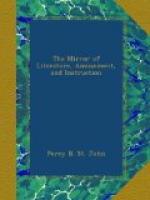the Slave Trade (1781.) Mrs. Hannah More has also written
several works of religious fiction, and above
all, some charming poems; Florio (1786,) and the Blue
Stocking, or Conversation. The Blue Stocking
is a burlesque name given to a lady’s coterie,
in which several females attempted to start a sort
of bureau d’esprit under the direction
of Mesdames Robinson and Piozzi, a coterie innocent
enough, but which excited the wrath of Mr. Gifford,
the Editor of the Quarterly Review, who fulminated
against it several satires in excessively bad taste,
and written in a tone of disgusting pedantry.
The verses of Mr. Gifford are infinitely more ridiculous
than those he pretends to correct. Amongst the
English ladies who have written romance, Miss Edgeworth,
Mrs. Inchbald, and Lady Morgan, are worthy of especial
note. Several ladies, without having written
works of great importance, have still produced poetical
pieces of graceful beauty; in this number it is but
justice to distinguish Mrs. Opie. And lastly,
in order to finish this hasty catalogue, we may remark
that there have appeared in England, in our days, several
ladies of a high order of literary, poetical, and
at the same time, philosophical talent. Lady
Morgan herself has contrived to mix up history and
romance in her writings, with great ability; but among
the ladies, who inscribed their fame on monuments
more durable than romantic stories, we must select
for honourable mention the names of Joanna Baillie,
Aikin, Benger, and Helen Maria Williams. Miss
Baillie, sister of the celebrated Dr. Baillie, the
physician, is a woman of the highest talent. It
is not your pretty nothings, your elegant trifles,
which occupy her genius; on the contrary, she has
attempted in a series of dramatic pieces, to paint
the most energetic passion of the human heart; and
her pieces, written in the most elevated and Shakspearian
tone, will always be regarded as the work of a superior
mind. John Kemble, in the part of Montfort,
reached the sublime of agony. In the writings
of Miss Baillie there is a combination of the solemn
and the poetical, which is rarely observed in women.
Miss Aikin has written some charming poems, far more
beautiful than any I have met with in the writings
of Miss Landon and Miss Mitford. The Mouse’s
Petition, by Miss Aikin, is a chef-d’oeuvre.
Miss Benger has published some historical works of
great interest, which place her in the same line with
Miss Aikin. Lastly, there is Helen Maria Williams,
whose muse, half English, half French, has published
poems, sonnets, and other pieces of verse, besides
several political and historical works. This superior
woman, at the same time that she gave birth, under
the influence of sensibility and fancy, to works of
inspiration, portrayed the details of the events of
the French revolution, in the centre of which she threw
herself, in 1792, from pure enthusiasm for liberty.—Foreign
Quarterly Review.




